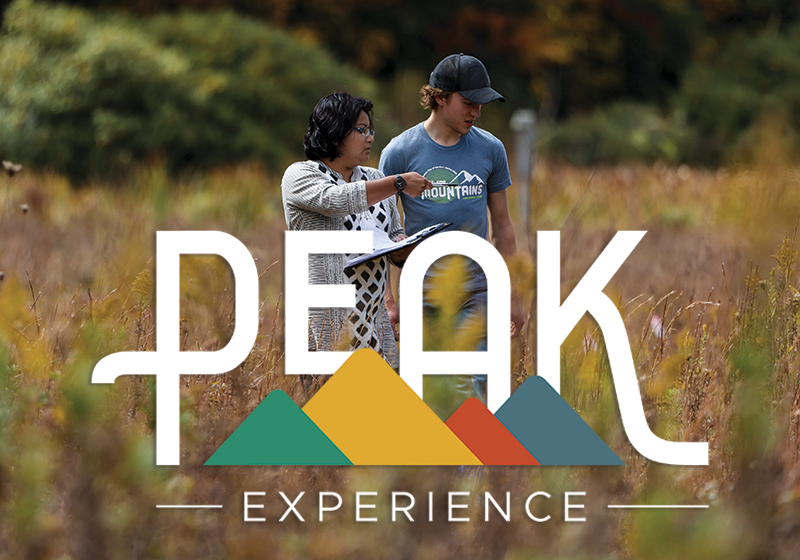
Outdoor Recreation Management courses train students to become stewards of the natural world
Many students who attend Lees-McRae College cite the institution’s location in the Blue Ridge Mountains and the plentiful opportunities for outdoor engagement as significant factors when making the decision to enroll. With the Outdoor Recreation Management academic program, the college ensures those opportunities are safeguarded and preserved.
The Outdoor Recreation Management program partners with the Leave No Trace Center for Outdoor Ethics to certify students in Leave No Trace training and education. The goal of Leave No Trace is to educate those who enjoy the outdoors and participate in activities such as hiking, camping, mountain biking, rock climbing, fishing, and more about the importance of protecting the environment while doing so.
According to the Leave No Trace website, “Nine out of ten people who visit the outdoors are uninformed about Leave No Trace or the importance of minimizing their impacts.” Improper outdoor behavior like leaving trash behind at a campsite, improperly putting out a campfire or cigarette, and feeding or interacting with wild animals leads to polluted water sources, erosion, forest fires, and animal deaths.
Students in the Outdoor Recreation Management program combat these problems by becoming educated about the importance of Leave No Trace and then educating others. All students who graduate with an Outdoor Recreation Management major or minor leave college with their Leave No Trace Trainer certification through the Outdoor Living Skills course (ORM 102). This 16-hour course authorizes students to deliver Awareness Workshops to their communities, employers, and other interested groups.
“These courses and certifications are great for students interested in careers in outdoor education, guiding, environmental education, or summer camps,” said Katie Wall, the program coordinator for Outdoor Recreation Management.
The students enrolled in ORM 102 for the Spring 2021 semester completed the certification course during an Outdoor Programs workshop on Earth Day, April 22. They spoke to students and other members of the college community about the importance of Leave No Trace and explained how everyone can take steps to minimize human impact on the outdoors.
“For me, Leave No Trace is a way to help other people experience what I’ve experienced,” said Carson Presson, a sophomore majoring in Outdoor Recreation Management. “With everything else going on with the planet, the least we can do is clean up after ourselves.”
McKenzie Jensen is a History major who was able to take ORM 102 during her senior year after participating in Outdoor Recreation Management courses as electives throughout her time at Lees-McRae, including Expedition Baja during Winter Break 2019. She has appreciated the chance to share her interests with the public and work together to protect the outdoors. “It’s important to me to leave these environments clean so I can come back, and others can come back, and enjoy it again,” she said.
For students who want to take their expertise a step farther, they can enroll in ORM 321, an elective course that results in the participant certifying as a Master Educator. The course takes place over five days and is the most comprehensive educational opportunity offered by Leave No Trace. Only 12 organizations in the country are authorized to offer it. Lees-McRae partners with Landmark Learning, a local educational institution that offers a variety of outdoor certification classes, including Wilderness First Aid and Wilderness First Responder training.
“Lees-McRae College has run Leave No Trace Master Educator courses annually as our partner in the Banner Elk region,” said Mairi Padgett, the founder and administrative director of Landmark Learning. “We are proud to include Katie Wall within our faculty roll. She brings an earthy, reachable program experience to our mutual students.”
The Master Educator course is available for a fee to students, faculty, staff, and the community. Participants engage in one day of classroom instruction, three days and two nights of field training, and one day of community outreach. By the end of the course, all participants are certified to conduct both two-day Trainer certification courses and one-hour or one-day Awareness Workshops.
Through the courses, Outdoor Recreation Management students learn the importance of adhering to the seven Leave No Trace principles—plan ahead and prepare, travel and camp on durable surfaces, dispose of waste properly, leave what you find, minimize campfire impacts, respect wildlife, and be considerate of other visitors—and gain the training to teach others about the need to protect outdoor spaces.
Lees-McRae offers numerous opportunities to engage with and care for the outdoors through academic programs like Outdoor Recreation Management, Wildlife Biology, and Wilderness Medicine and recreational activities like mountain biking, kayaking, fly fishing, and rock climbing. By emphasizing Leave No Trace policies, the students and faculty can preserve the surrounding land for future generations.


